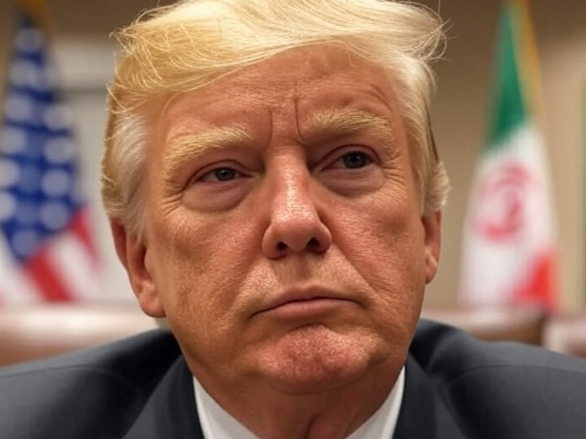President Trump Still Hopes For Iran Nuclear Deal:As the Iran-Israel conflict intensifies, President Trump leaves the G7 summit early but remains hopeful for a future nuclear deal with Iran. While refusing to sign the G7’s joint statement urging de-escalation, Trump backs Israel’s military actions and issues strong warnings to Tehran. His stance has divided global leaders, with France supporting potential US-led ceasefire efforts, Britain calling for restraint, and Japan condemning Israel’s strikes. The rapidly escalating crisis places Trump at the center of high-stakes diplomacy.
President Trump Still Hopes For Iran Nuclear Deal
Trump abruptly left the G7 summit amid rising tensions between Israel and Iran. The US President announced his early departure, stating, “I have to be back. Very important. I want to just thank our great host. Thank you, Canada. But you probably see what I see and have to be back as soon as I can.” His decision came after a day of intense discussions with G7 leaders focusing on the urgent need for a negotiated solution to prevent the conflict from escalating further.
Shortly after leaving, Trump took to his Truth Social network to express strong support for Israel and issue warnings directed at Iran. In his post, he advised immediate evacuation, though the message lacked specific details. Later, the White House press secretary confirmed that Trump would return to Washington late Monday, a full day earlier than originally scheduled. His early departure means that Trump will miss several scheduled meetings, including crucial discussions with the leaders of Ukraine and Mexico.
Throughout the crisis, Trump has avoided directly confirming whether the United States would participate in any Israeli military action. He maintained that the US was not involved in the initial Israeli strikes but left open the possibility of future actions.
Addressing reporters, Trump expressed optimism that Iran would eventually agree to a new nuclear deal, emphasizing that, “the United States will be doing something” if no agreement is reached. Reflecting on previous negotiations, Trump stated, “I gave Iran 60 days and they said no and the 61st you saw what happened day 61.” He added that talks continue via telephone but noted that face-to-face discussions are always preferable.
Significantly, Trump refused to sign a draft joint statement prepared by G7 leaders, which called for de-escalation between Israel and Iran. This divergence exposed the growing divide among global powers on how to handle the rapidly deteriorating situation. French President Emmanuel Macron, while urging restraint, suggested that France would fully support any US-brokered ceasefire.
Speaking to reporters, Macron pleaded with both Israel and Iran to halt all strikes targeting civilians and vital infrastructure, saying, “It is absolutely essential that all strikes by both sides against energy, administrative and cultural infrastructure and even more so against the civilian population cease. Nothing justifies them. They are absolutely intolerable.”
British Prime Minister also echoed concerns over Iran’s nuclear program but stressed the need for de-escalation, noting that while Israel has the right to self-defense, the primary focus must be to reduce tensions. “We have to find a way to de-escalate the situation. Notwithstanding the concerns that we all have about the nuclear program, there must be de-escalation, and that will be the central focus of much of the discussion today,” he said.
In contrast, Japan, historically maintaining strong ties with Iran, broke ranks with its Western allies. Japan condemned Israel’s attacks, calling them completely unacceptable and deeply regrettable. This further highlighted the international divisions over how to address the growing crisis.
Adding depth to the ongoing debate, experts like Peter Khnik and independent journalist Antony Loewenstein shared their critical perspectives. Loewenstein argued that Israeli Prime Minister Netanyahu was a global menace and accused him of initiating the conflict. He pointed to the International Criminal Court’s warrant for Netanyahu’s arrest and criticized Israel’s actions in Gaza and now against Iran.
Loewenstein emphasized that while Iran’s government has been repressive for decades, Israel’s attack was unprovoked and based on what he called a false premise that Iran was on the verge of building a nuclear weapon. “A few months ago, the US itself declared that there was no evidence that Iran was developing a nuclear weapon. Israel has provided zero evidence that that has changed,” he stated.
According to Loewenstein, the US likely played a supporting role in the conflict, not necessarily through direct military involvement but by assisting Israel’s defense when Iran retaliated. He suggested that Israel may have pushed the US into a supportive position, saying, “It seems pretty clear now that there was a degree of subterfuge that was pushed by Israel and therefore the US.”
Despite his criticism, Loewenstein noted the paradox that Trump might be the only leader capable of ending the conflict. “The idea that Trump is somehow a peacemaker is absurd. On the other hand, the only person who can probably stop this madness is Trump,” he remarked. He also criticized Trump’s earlier warnings telling 10 million residents of Tehran to evacuate, calling such messages absurd given that roads were blocked and many Iranian cities were already under attack.
As the situation grows darker, the world watches closely. The escalating conflict, conflicting global positions, and uncertain diplomacy leave the world in a precarious state, with hopes resting on whether Trump and the involved nations can de-escalate the confrontation before it spirals further out of control

